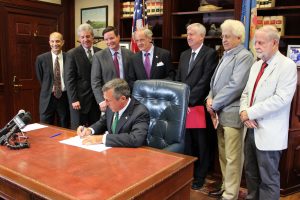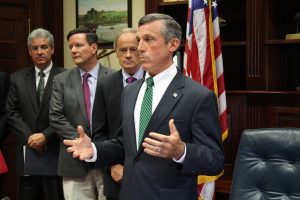Delaware Governor Jack Markell along with federal, state, Kent County and City of Dover officials and other dignitaries today joined Calpine Corporation (CPN) Chief Executive Officer Jack Fusco in celebrating the groundbreaking of the Garrison Energy Center, a 309-megawatt power plant to be built in the Garrison Oak Technology Park in Dover, Delaware. Construction is expected to be completed by the second quarter of 2015.
“When Calpine opened its regional headquarters in Delaware in late 2010, the Company announced its commitment to cleaner energy by converting the Edge Moor Energy Center from coal to natural gas as a fuel,” said Governor Markell. “Today, we celebrate Calpine’s continuing commitment to Delaware’s economy and environment by breaking ground on a new natural gas power-generating project. It’s cleaner power that’s better for the environment and better for Delaware.”
“Calpine’s Garrison Energy Center will be a state-of-the-art, natural gas-fired power plant producing reliable, affordable, clean power for central Delaware,” said Jack Fusco, Calpine’s Chief Executive Officer. “This is a win-win project made possible by the collaborative efforts between Calpine and the various stakeholders including the state and local authorities. This project also demonstrates the benefits of competitive electric markets by helping to ensure that Delawareans are not burdened with above-market costs associated with subsidized contracts, as has been the case in surrounding states, and that Delaware continues to have a competitive advantage in attracting business and jobs.”
“The groundbreaking and associated construction of the Garrison Energy Center marks a major milestone for the City of Dover,” said Mayor Carleton E. Carey Sr. “It is with great pride that we welcome Calpine as it builds the anchor facility at the Technology Park. The construction of this modern power plant helps fulfill our vision for the park. We appreciate the economic boost Calpine is helping to deliver to our area and look forward to the operation of this energy-efficient facility.”
“In bringing its Garrison Energy Center to Dover, along with more than 250 construction jobs and 16 permanent operating jobs, Calpine will be tapping into a Kent County employment base that is ready to roll up its sleeves and get to work,” said Alan Levin, Chairman of the New Jobs Infrastructure Fund and Director of the Delaware Economic Development Office. “And, in Calpine, Dover and the surrounding area will be welcoming a company that cares about the community it serves.”
A $2.5 million grant from the New Jobs Infrastructure Fund will help fund the construction of a six-mile natural gas pipeline extension to the Garrison Oak Technology Park. In addition to providing fuel to the plant, this pipeline will help spur development of other businesses in the park and improve the availability of natural gas for other businesses and consumers in central Delaware.
“With the conversion of the old Edge Moor power plant, Calpine made a significant contribution to improving Delaware’s air quality while providing cleaner power,” added Collin O’Mara, Secretary of the Delaware Department of Natural Resources and Environmental Control. “With the Garrison Energy Center, Calpine is providing central Delaware with a brand new source of clean power that will contribute to lower energy prices and a healthier environment for Delawareans for many years to come.”
About Calpine
Calpine Corporation generates more electricity than any other independent power producer in America, with a fleet of 93 power plants in operation or under construction, representing more than 27,000 megawatts of generation capacity. Serving customers in 20 states and Canada, we specialize in developing, constructing, owning and operating natural gas-fired and renewable geothermal power plants that use advanced technologies to generate power in a low-carbon and environmentally responsible manner. Our clean, efficient, modern and flexible fleet is uniquely positioned to benefit from the secular trends affecting our industry, including the abundant and affordable supply of clean natural gas, stricter environmental regulation, aging power generation infrastructure and the increasing need for dispatchable power plants to successfully integrate intermittent renewables into the grid. We focus on competitive wholesale power markets and advocate for market-driven solutions that result in nondiscriminatory forward price signals for investors. Please visit www.calpine.com to learn more about why Calpine is a generation ahead – today.
Forward-Looking Information
In addition to historical information, this release contains forward-looking statements within the meaning of Section 27A of the Securities Act of 1933, as amended, and Section 21E of the Securities Exchange Act of 1934, as amended. Words such as “believe,” “intend,” “expect,” “anticipate,” “plan,” “may,” “will” and similar expressions identify forward-looking statements. Such statements include, among others, those concerning expected financial performance and strategic and operational plans, as well as assumptions, expectations, predictions, intentions or beliefs about future events. You are cautioned that any such forward-looking statements are not guarantees of future performance and that a number of risks and uncertainties could cause actual results to differ materially from those anticipated in the forward-looking statements. Please see the risks identified in this release or in Calpine’s reports and registration statements filed with the Securities and Exchange Commission, including, without limitation, the risk factors identified in its Annual Report on Form 10-K for the year ended Dec. 31, 2012. These filings are available by visiting the Securities and Exchange Commission’s website at www.sec.gov or Calpine’s website at www.calpine.com. Actual results or developments may differ materially from the expectations expressed or implied in the forward-looking statements, and Calpine undertakes no obligation to update any such statements.
Photos and video from the groundbreaking can be viewed on Flickr and YouTube.

 By December 15, the working group will submit a report to the Governor that makes recommendations on short- and long-term strategies for developing wind power to serve Delaware, and plans to develop job opportunities in the offshore wind industry. The group also will draft any necessary legislation, including possible amendments to Delaware’s Renewable Energy Portfolio Standards Act.
By December 15, the working group will submit a report to the Governor that makes recommendations on short- and long-term strategies for developing wind power to serve Delaware, and plans to develop job opportunities in the offshore wind industry. The group also will draft any necessary legislation, including possible amendments to Delaware’s Renewable Energy Portfolio Standards Act.